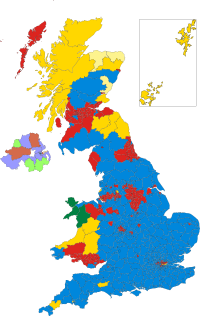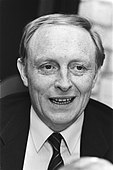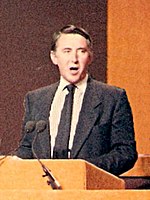| |||||||||||||||||||||||||||||||||||||||||||||||||||
All 650 seats in the House of Commons 326 seats needed for a majority | |||||||||||||||||||||||||||||||||||||||||||||||||||
|---|---|---|---|---|---|---|---|---|---|---|---|---|---|---|---|---|---|---|---|---|---|---|---|---|---|---|---|---|---|---|---|---|---|---|---|---|---|---|---|---|---|---|---|---|---|---|---|---|---|---|---|
| Opinion polls | |||||||||||||||||||||||||||||||||||||||||||||||||||
| Turnout | 75.3% ( | ||||||||||||||||||||||||||||||||||||||||||||||||||
| |||||||||||||||||||||||||||||||||||||||||||||||||||
 Colours denote the winning party—as shown in § Results | |||||||||||||||||||||||||||||||||||||||||||||||||||
 Composition of the House of Commons after the election | |||||||||||||||||||||||||||||||||||||||||||||||||||
| |||||||||||||||||||||||||||||||||||||||||||||||||||
The 1987 United Kingdom general election was held on Thursday 11 June 1987, to elect 650 members to the House of Commons. The election was the third consecutive general election victory for the Conservative Party, who won a majority of 102 seats and second landslide under the leadership of Margaret Thatcher, who became the first Prime Minister since the Earl of Liverpool in 1820 to lead a party into three successive electoral victories.
The Conservatives ran a campaign focusing on lower taxes, a strong economy and strong defence. They also emphasised that unemployment had just fallen below the 3 million mark for the first time since 1981, and inflation was standing at 4%, its lowest level since the 1960s. National newspapers also continued to largely back the Conservative government, particularly The Sun, which ran anti–Labour Party articles with headlines such as "Why I'm backing Kinnock, by Stalin".[1]
Labour, led by Neil Kinnock following Michael Foot's resignation in the aftermath of the party's landslide defeat at the 1983 general election, was slowly moving towards a more centrist policy platform, following the promulgation of a left-wing one under Foot's leadership. The main aim of the Labour Party was to re-establish itself as the main progressive centre-left alternative to the Conservatives, after the rise of the Social Democratic Party (SDP) forced Labour onto the defensive; and Labour succeeded in doing so at this general election. The Alliance between the SDP and the Liberal Party was renewed, but co-leaders David Owen and David Steel could not agree whether to support either major party in the event of a hung parliament.
The Conservatives were returned to government, having suffered a net loss of only 21 seats, which left them with 376 MPs and a reduced but still strong majority of 102 seats. Labour succeeded in resisting the challenge by the SDP–Liberal Alliance to maintain its position as HM Official Opposition. Moreover, Labour managed to increase its vote share in Scotland, Wales and the North of England. Yet Labour still returned only 229 MPs to Westminster; and in certain London constituencies which Labour had held before the election, the Conservatives actually made gains.
The election was a disappointment for the Alliance, which saw its vote share fall and suffered a net loss of one seat as well as former SDP leader Roy Jenkins losing his seat to Labour. This led to the two Alliance parties merging completely soon afterwards to become the Liberal Democrats. In Northern Ireland, the main unionist parties maintained their alliance in opposition to the Anglo-Irish Agreement; however, the Ulster Unionist Party (UUP) lost two seats to the Social Democratic and Labour Party (SDLP). One of the UUP losses was former Cabinet Minister Enoch Powell, famous for his stance against immigration, and formerly a Conservative MP.
To date the Conservatives have not matched or surpassed their 1987 seat total in any general election held subsequently, although they recorded a greater share of the popular vote in the 2019 general election. The 50th Parliament was the last time to date that a Conservative government has lasted a full term with an overall majority of seats in Parliament, until the 2019-2024 parliament.
The election night was covered live on the BBC, presented by David Dimbleby, Peter Snow and Robin Day.[2] It was also broadcast on ITV, presented by Sir Alastair Burnet, Peter Sissons and Alastair Stewart.
The 1987 general election saw the election of the first Black Members of Parliament: Diane Abbott, Paul Boateng and Bernie Grant, all as representatives for the Labour Party. Other newcomers included future Cabinet members David Blunkett and John Redwood, future Shadow Cabinet minister Ann Widdecombe, and future SNP Leader Alex Salmond. MPs who left the House of Commons as a result of this election include former Labour Prime Minister James Callaghan, Keith Joseph, Jim Prior, Ian Mikardo, former SDP leader and Labour Cabinet Minister Roy Jenkins, former Health Minister Enoch Powell (who had defected to the UUP in Northern Ireland from the Conservatives in 1974) and Clement Freud.
Cite error: There are <ref group=lower-alpha> tags or {{efn}} templates on this page, but the references will not show without a {{reflist|group=lower-alpha}} template or {{notelist}} template (see the help page).
- ^ Thomas, James (7 May 2007). Popular Newspapers, the Labour Party and British Politics. Routledge. p. 103. ISBN 978-1-135-77373-1.
- ^ BBC Election 1987 coverage on YouTube



